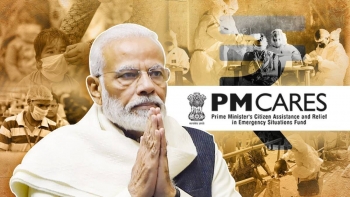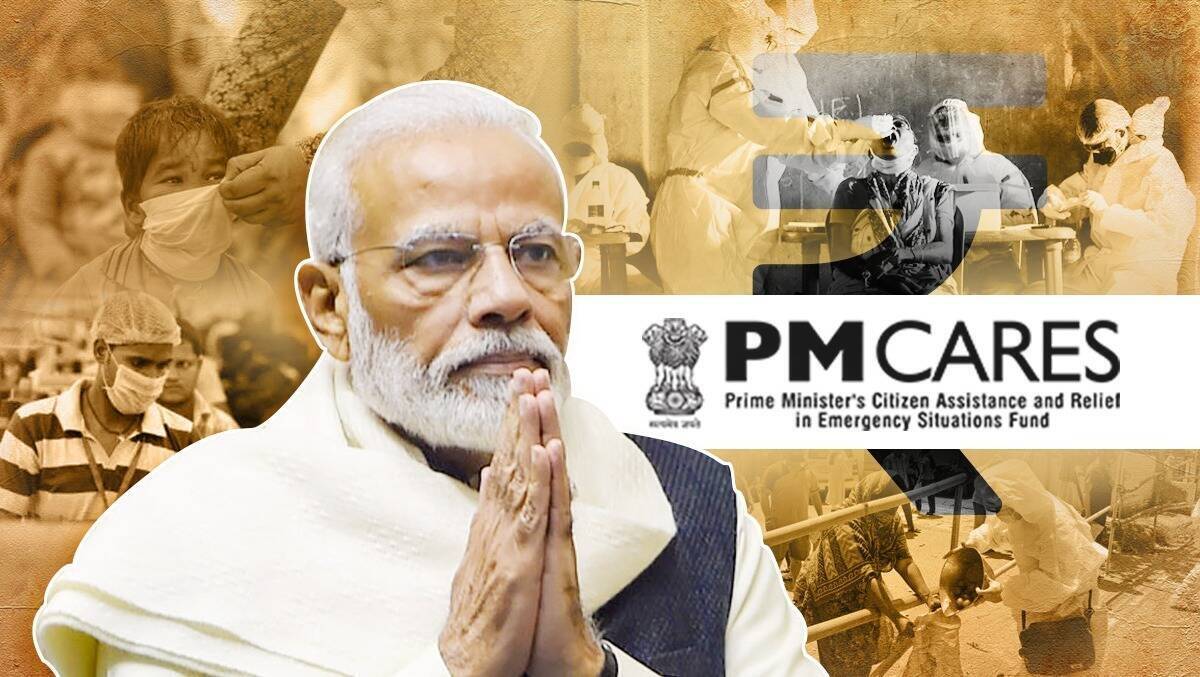
.jpg) Isaac Gomes
Isaac Gomes

The government is adopting a policy of secrecy and non-disclosure on matters relating to PM CARES Fund. As per the copy of the Deed, the Trust was established on 27th March 2020, as a Public Charitable Trust, to provide assistance and relief in emergency or distress situations, similar to those posed by the COVID-19 pandemic. The Deed (Registration Number is 163 in Book 4 Volume No. 1685 07:11:12 PM) was signed in Hindi by the Prime Minister with his photo. There were two witnesses Bhaskar Khulbe and Rajeev Topno ((1996 batch IAS from Gujarat cadre). Incidentally Rajeev Topno is an alumnus of St Thomas Boys’ School Khiderpore and St Xavier’s College Kolkata. Currently he is Senior Adviser to the Executive Director of the World Bank in Washington DC. (Source: The Hindu, 4 June 2020).
Within the first five days of its launch, Rs 3,076.62 crore was collected through contributions received from individuals and corporates who got 100% IT exemption under Corporate Social Responsibility (CSR). The result was State governments and local NGOs were deprived of CSR funds. This adversely impacted state-level grassroots development projects, as CSR Funds from April 2020 onwards were also diverted to PM CARES Fund. The website does not give any disclosure (even a figure) for collections after April 2020.
As the government did not disclose sufficient information on the official website regarding the nature of the fund, its usage, etc, applications were filed by different people under the Right to Information Act (RTI) to obtain necessary information. In reply, the Prime Minister’s Office (PMO) refused to provide any information, on the grounds that the fund was not a Public Authority under Section 2(h) of the RTI Act. All the subsequent RTI applications were also rejected on the same grounds. Consequently, a Public Interest Litigation (PIL) was filed before the Delhi High Court to bring the fund under the ambit of the RTI Act. The case is going on.
In order to understand whether the PM CARES Fund is a public authority or not, it is important to understand “public authority” as provided under Section 2(h) of the RTI Act. It states that:
“(h) “public authority” means any authority or body or institution of self-government established or constituted –
(a) by or under the Constitution;
(b) by any other law made by Parliament;
(c) by any other law made by State Legislature;
(d) by notification issued or order made by the appropriate Government, and includes any –
i. body owned, controlled or substantially financed;
ii. non-Government Organisation substantially financed, directly or indirectly by funds provided by the appropriate Government;
While PM CARES Fund in not a public authority under clauses (a), (b) or (c), the clinching point is whether the Fund comes under sub-clauses (i) of Section 2(h)(d) i.e. “body owned, controlled or substantially financed” by the appropriate government.
The three conditions provided under this clause are (1) ownership, (2) control and (3) substantial finance. Even if one of the conditions is satisfied by any authority, it will be termed as a public authority. This has been laid down by the Delhi High Court in the case of National Stock Exchange of India Limited versus Central Information Commission and Others (“NSE Case”).
To arrive at whether or not PM CARES Fund is a public authority, the Trust Deed released by the government in December 2020 will serve as a guide to determine its true nature. The Fund has been established as a public charitable trust but that does not exempt it from the purview of the RTI Act, as claimed by a PMO Under-Secretary in Delhi High Court recently. The Bombay High Court has already clarified that a public charitable trust will be considered a public authority under the RTI Act if it satisfies the condition of sub-clauses (i) of Section 2(h)(d) i.e. if it is owned or controlled or substantially financed by the government. The three conditions being non-cumulative, we will look at only the ‘control’ aspect of the Trust in this analysis without delving into the ‘ownership’ and ‘substantially financed’ aspect of the trust.
Clause 5.3 of the Trust Deed states: “There is no control of either the central government or any state governments, either direct or indirect, in the functioning of the trust in any manner whatsoever.” It is a settled rule that the intention of the settler (the entity which established the Trust) must be gathered by reading the Trust deed as a whole and no one clause should be construed in isolation. Therefore, this clause cannot be considered conclusive on the issue of control as various other clauses in the Trust Deed convey a different meaning.
According to Clause 8 of the Trust Deed, the Board of Trustees (“Board”) has complete control over management and administration of the trust. Further, the Prime Minister as Chairperson has the absolute power to nominate three other trustees from among the eminent persons in various fields like law, health, science, etc. (Clause 6.4). The Board has the power to “appoint such office bearers as they may deem fit and such appointees will be directly responsible and answerable to the Trustees who shall have the power to remove or replace them” (Clause 11). So the Deed itself proves that Union Government, headed by the PM as Chairperson, has absolute control over the collection and administration of the Fund.
In the landmark case of Pradeep Kumar Biswas Versus Indian Institute of Chemical Biology, the Supreme Court held that if the government has a dominant role to play in terms of power to appoint a secretary and nominate/terminate members of the governing board, then it is said to have control over the body. In the case of the PM CARES Fund, the core Cabinet Ministers (Prime Minister, Union Ministers of Home, Defence and Finance – Clause 6) who hold the positions of trustees are not just ceremonial heads, but the entire management and administration of the fund are in their grip.
The fund is headed by a constitutional authority, the Prime Minister, who as per Clause 6.7 of the Deed, has complete power to (i) add a person as a Trustee (ii) remove a trustee (iii) replace any existing Trustee with another person as Trustee. The PMO provides to the trustees, administrative and secretarial support which is required for the management and administration of the trust (Clause 6.8 of the deed). Joint Secretary (Administration) in the PMO acts as a secretary to the Fund and looks after its administration.
The decisions taken by the authorities regarding the operation of the PM CARES Fund cannot be said to have been made in a personal capacity. It must be considered to be official decisions taken by a public authority because the fund is not being used for personal purposes but for the furtherance of public purposes, as is clear from the following objectives of the Trust (Clause 4.2):
1. “To undertake and support relief or assistance of any kind relating to a public health emergency or any other kind of emergency, calamity or distress, either man-made or natural, including the creation or upgradation of healthcare or pharmaceutical facilities, other necessary infrastructure, funding relevant research or any other type of support.
2. To render financial assistance, provide grants of payments of money or take such other steps as may be deemed necessary by the Board of Trustees to assist the affected population.
3. To undertake any other activity which is not inconsistent with the above Objects.”
Further, the fund’s physical infrastructure is the same as that of the Central Government. It is housed in the PMO, and no separate expenditure is being incurred on its management as it is managed by the PMO officers on an honorary basis. The Fund uses the state emblem of the Sarnath Lion Capital of Ashoka as its logo. Moreover, the fund uses the official domain ‘gov.in’ which is reserved only for a few government departments and agencies.
In the light of all these, it is crystal-clear that the government has ‘substantial’ control over the fund, and not merely a supervisory or regulatory control. Therefore, it meets the requirement of section 2(h)(d)(i) as laid down by the Supreme Court in Thalappalam Service Cooperative Bank Ltd Versus State of Kerala, 2013. Hence it should be considered a public authority under the RTI Act.
One interesting point in Clause 8.1(w) of the Trust Deed is: “In circumstances where deemed necessary, the Trust may permit any other public charitable trust or institution having similar objectives to amalgamate or transfer, all or part of their assets to this Trust.” (Read: gobble up)!
PM CARES Fund is a matter of Transparency and Accountability – both nationally and internationally. Will the PM disband the Trust and liquidate the Fund once he is out of power?
(Inputs taken from The Wire, February 25, 2021)